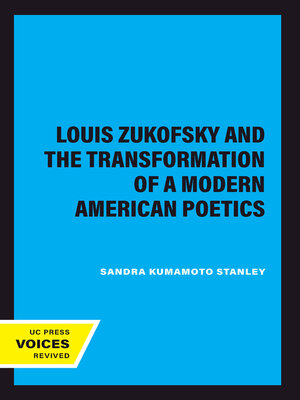
Sign up to save your library
With an OverDrive account, you can save your favorite libraries for at-a-glance information about availability. Find out more about OverDrive accounts.
Find this title in Libby, the library reading app by OverDrive.



Search for a digital library with this title
Title found at these libraries:
| Loading... |
Viewing Louis Zukofsky as a reader, writer, and innovator of twentieth-century poetry, Sandra Stanley argues that his works serve as a crucial link between American modernism and post- modernism.
Like Ezra Pound, Zukofsky saw himself as a participant in the transformation of a modern American poetics; but unlike Pound, Zukofsky, the ghetto-born son of an immigrant Russian Jew, was keenly aware of his marginal position in society. Championing the importance of the little words, such as a and the, Zukofsky effected his own proletarian "revolution of the word."
Stanley explains how Zukofsky emphasized the materiality of language, refusing to reduce it to a commodity controlled by an "authorial/authoritarian" self. She also describes his legacy to contemporary poets, particularly such Language poets as Ron Silliman and Charles Bernstein.
This title is part of UC Press's Voices Revived program, which commemorates University of California Press's mission to seek out and cultivate the brightest minds and give them voice, reach, and impact. Drawing on a backlist dating to 1893, Voices Revived makes high-quality, peer-reviewed scholarship accessible once again using print-on-demand technology. This title was originally published in 1994.
Viewing Louis Zukofsky as a reader, writer, and innovator of twentieth-century poetry, Sandra Stanley argues that his works serve as a crucial link between American modernism and post- modernism.
Like Ezra Pound, Zukofsky saw himself as a parti
Like Ezra Pound, Zukofsky saw himself as a participant in the transformation of a modern American poetics; but unlike Pound, Zukofsky, the ghetto-born son of an immigrant Russian Jew, was keenly aware of his marginal position in society. Championing the importance of the little words, such as a and the, Zukofsky effected his own proletarian "revolution of the word."
Stanley explains how Zukofsky emphasized the materiality of language, refusing to reduce it to a commodity controlled by an "authorial/authoritarian" self. She also describes his legacy to contemporary poets, particularly such Language poets as Ron Silliman and Charles Bernstein.
This title is part of UC Press's Voices Revived program, which commemorates University of California Press's mission to seek out and cultivate the brightest minds and give them voice, reach, and impact. Drawing on a backlist dating to 1893, Voices Revived makes high-quality, peer-reviewed scholarship accessible once again using print-on-demand technology. This title was originally published in 1994.
Viewing Louis Zukofsky as a reader, writer, and innovator of twentieth-century poetry, Sandra Stanley argues that his works serve as a crucial link between American modernism and post- modernism.
Like Ezra Pound, Zukofsky saw himself as a parti






